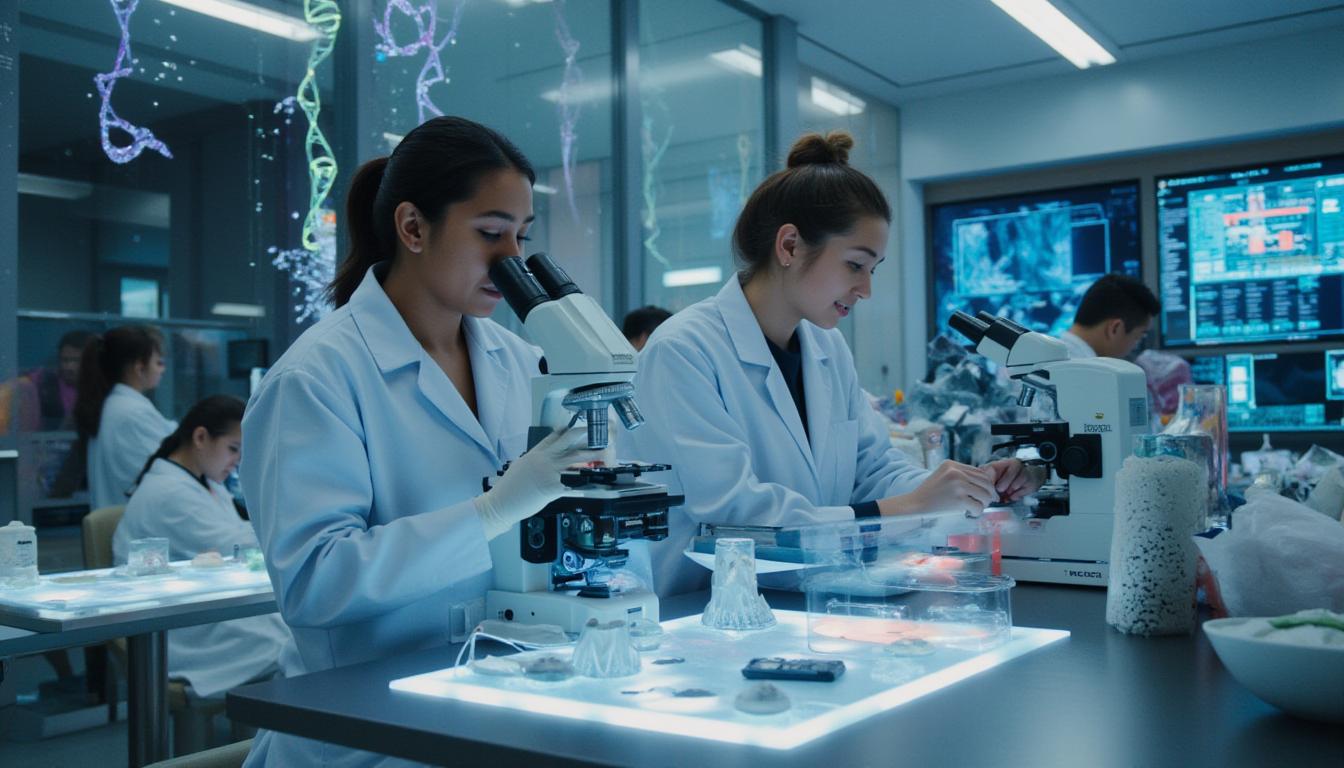Biotechnology Engineering Programs: Complete Beginner’s Guide
Biotechnology Engineering Programs

Biotechnology is one of the most promising fields in modern science and technology, bridging biology and technology to create innovative solutions in medicine, agriculture, environment, and industry. For beginners, understanding Biotechnology Engineering Programs can open doors to a rewarding career. This guide will provide an in-depth overview of the field, its education, career prospects, and opportunities, particularly highlighting programs offered by the Dr. M.C. Saxena Group of Colleges (MCSGOC).
1. What is Biotechnology Engineering?
Biotechnology Engineering is an interdisciplinary branch of engineering that combines biology, chemistry, genetics, and engineering principles. It focuses on developing technologies to solve real-world problems in healthcare, agriculture, environmental conservation, and industrial processes.
Key areas include:
-
Genetic Engineering
-
Molecular Biology
-
Bioprocess Engineering
-
Bioinformatics
-
Pharmaceutical Biotechnology
Importance for Beginners: Biotechnology is not just about laboratory work. It encompasses research, product development, and innovation, making it an ideal field for students who are curious and solution-oriented.
2. Why Choose Biotechnology Engineering Programs?
Choosing a Biotechnology Engineering Program offers multiple advantages:
-
Diverse Career Opportunities: Graduates can work in healthcare, agriculture, pharmaceuticals, research, or environmental industries.
-
Cutting-edge Technology: Exposure to CRISPR, genome sequencing, bioinformatics, and nanotechnology.
-
Contribution to Society: Biotechnologists develop vaccines, sustainable agriculture solutions, and clean energy technologies.
-
Academic Growth: Opportunities to pursue higher studies, including M.Tech, Ph.D., and specialized certifications.
3. Eligibility Criteria for Biotechnology Engineering Programs
Before enrolling in a biotechnology program, students must meet certain educational criteria:
-
Completion of 10+2 with Physics, Chemistry, and Biology/Mathematics.
-
Minimum marks: Often 50–60% in qualifying exams.
-
Entrance exams: Some colleges require scores from exams like JEE, WBJEE, or state-level tests.
-
English proficiency: Students must have basic English proficiency for coursework and research papers.
Note: Institutes like MCSGOC provide guidance for both admission exams and academic preparation.
4. Structure of Biotechnology Engineering Programs
Biotechnology programs usually span 4 years (8 semesters) and include:
4.1 Core Subjects
-
Microbiology
-
Genetic Engineering
-
Biochemistry
-
Molecular Biology
-
Cell Biology
-
Bioprocess Technology
4.2 Practical Labs
Hands-on training is crucial for understanding laboratory techniques, including:
-
DNA/RNA extraction
-
Enzyme assays
-
Fermentation technology
-
Bioinformatics simulations
4.3 Electives and Specializations
Students may choose specialized electives in areas such as:
-
Pharmaceutical Biotechnology
-
Environmental Biotechnology
-
Agricultural Biotechnology
-
Industrial Biotechnology
4.4 Internships and Research Projects
Internships and live projects give real-world exposure, preparing students for industrial and research roles. MCSGOC emphasizes practical experience through lab projects, collaborations, and industry visits.
5. Career Opportunities After Biotechnology Engineering Programs
Graduates of biotechnology programs can pursue careers in:
-
Healthcare and Pharmaceuticals
-
Clinical Research Associate
-
Biopharmaceutical Scientist
-
Medical Lab Technologist
-
-
Agriculture and Food Industry
-
Agricultural Biotechnologist
-
Food Safety Analyst
-
Plant Genetic Engineer
-
-
Research and Academia
-
Research Scientist
-
University Lecturer
-
Laboratory Manager
-
-
Industrial Biotechnology
-
Bioprocess Engineer
-
Quality Control Analyst
-
Biomanufacturing Specialist
-
Salary Expectations: Entry-level positions typically start at ₹3–6 LPA, while experienced professionals in research and industrial roles can earn ₹10–20 LPA or more.
6. Top Skills Required for Biotechnology Students
-
Analytical Thinking: Ability to interpret data and analyze results.
-
Laboratory Skills: Proficiency in modern lab techniques and equipment.
-
Problem-Solving: Developing innovative solutions in medicine, agriculture, or industry.
-
Communication Skills: Writing research papers, reports, and presentations.
-
Teamwork: Collaborating with scientists, engineers, and researchers.
7. Advantages of Studying Biotechnology at MCSGOC
The Dr. M.C. Saxena Group of Colleges (MCSGOC) provides a comprehensive learning environment:
-
Experienced faculty with industry and research expertise
-
Well-equipped labs and modern infrastructure
-
Industry collaborations and internship opportunities
-
Focus on innovation, research, and entrepreneurship
-
Guidance for competitive exams and higher studies
8. Future Trends in Biotechnology
Biotechnology is evolving rapidly. Key future trends include:
-
Personalized Medicine: Tailored treatments based on genetics.
-
Synthetic Biology: Engineering organisms for industrial or environmental purposes.
-
Bioinformatics: Integrating data science with biological research.
-
Environmental Biotechnology: Bioremediation and sustainable solutions.
-
Agricultural Innovations: Genetically modified crops and sustainable farming practices.
9. Tips for Beginners in Biotechnology Engineering Programs
-
Focus on Fundamentals: Strong foundation in biology, chemistry, and mathematics.
-
Engage in Research Early: Participate in lab projects and workshops.
-
Develop Technical Skills: Learn bioinformatics tools, lab software, and data analysis.
-
Stay Updated: Follow scientific journals, biotechnology news, and conferences.
-
Networking: Connect with professionals, alumni, and professors for mentorship.
10. Higher Education Options
After completing a Biotechnology Engineering Program, students can pursue:
-
M.Tech in Biotechnology or Bioinformatics
-
MBA in Healthcare or Biotech Management
-
Ph.D. for research-oriented careers
-
Certification courses in specialized areas such as stem cell research, molecular diagnostics, or synthetic biology
11. Challenges in Biotechnology and How to Overcome Them
While biotechnology offers immense opportunities, students may face:
-
High Competition: Overcome through skill development and certifications.
-
Rapid Technological Changes: Keep learning through workshops, online courses, and seminars.
-
Ethical and Regulatory Challenges: Understand bioethics and safety regulations.
12. Conclusion
Enrolling in Biotechnology Engineering Programs opens up a world of opportunities in healthcare, agriculture, industry, and research. With strong foundational knowledge, practical skills, and guidance from reputed institutions like Dr. M.C. Saxena Group of Colleges (MCSGOC), beginners can embark on a rewarding career. The future of biotechnology is bright, and the scope for innovation and contribution to society is enormous.
Focus Keyword Usage: “Biotechnology Engineering Programs” has been strategically included throughout the blog to optimize for search relevance.
FAQ: Biotechnology Engineering Programs
1. What are Biotechnology Engineering Programs?
Biotechnology Engineering Programs are undergraduate or postgraduate courses that combine biology, chemistry, and engineering principles. These programs aim to develop skills in genetic engineering, bioprocess technology, molecular biology, and bioinformatics to solve real-world problems in healthcare, agriculture, and industry.
2. Who is eligible for Biotechnology Engineering Programs?
Eligibility typically includes:
-
Completion of 10+2 with Physics, Chemistry, and Biology/Mathematics
-
Minimum qualifying marks (usually 50–60%)
-
Entrance exam scores (state-level or national exams like JEE)
Some colleges may also consider board exam results and personal interviews.
3. How long is a Biotechnology Engineering Program?
Most undergraduate programs last 4 years, divided into 8 semesters. Postgraduate programs like M.Tech or M.Sc. typically last 2 years, while doctoral research programs may take 3–5 years, depending on the research scope.
4. What are the core subjects in biotechnology engineering?
Key subjects include:
-
Microbiology
-
Genetic Engineering
-
Biochemistry
-
Molecular Biology
-
Cell Biology
-
Bioprocess Technology
Students also study electives based on specialization areas.
5. What practical skills will I gain in a biotechnology program?
Students gain hands-on experience in:
-
DNA and RNA extraction
-
Protein purification
-
Enzyme assays
-
Fermentation technology
-
Bioinformatics software
These skills prepare graduates for lab, industrial, and research roles.
6. What career options are available after biotechnology engineering?
Graduates can pursue careers in:
-
Healthcare and pharmaceuticals
-
Agriculture and food industry
-
Environmental biotechnology
-
Industrial biotechnology
-
Research and academia
Roles include bioprocess engineer, research scientist, clinical research associate, and lab manager.
7. Can I pursue higher studies after biotechnology engineering?
Yes, graduates can pursue:
-
M.Tech or M.Sc. in Biotechnology or Bioinformatics
-
MBA in Healthcare or Biotech Management
-
Ph.D. programs for advanced research
-
Specialized certification courses in molecular diagnostics, stem cell research, or synthetic biology
8. What are the top skills required for biotechnology students?
-
Analytical thinking for interpreting scientific data
-
Laboratory skills for experiments and protocols
-
Problem-solving for innovative research and solutions
-
Communication skills for reports, research papers, and presentations
-
Teamwork for collaborative projects and industrial research
9. Is biotechnology suitable for beginners?
Yes, biotechnology is ideal for beginners with a curiosity for biology, chemistry, and technology. Foundational courses in 10+2 science, along with practical exposure, prepare students to adapt quickly to advanced topics.
10. What are the future trends in biotechnology?
Some key trends include:
-
Personalized medicine and genomics
-
Synthetic biology and bioengineering
-
Bioinformatics and computational biology
-
Environmental biotechnology and bioremediation
-
Agricultural innovations, including GM crops and sustainable farming
11. How much can a biotechnology graduate earn?
-
Entry-level salaries: ₹3–6 LPA
-
Mid-level positions: ₹6–12 LPA
-
Experienced roles in research, industry, or biotechnology firms: ₹10–20 LPA or more
Salaries depend on experience, specialization, and job location.
12. Are internships necessary in biotechnology programs?
Yes. Internships provide practical experience, industry exposure, and research opportunities. They help students apply theoretical knowledge, develop lab skills, and build professional networks.
13. Can I specialize in biotechnology?
Yes, students can choose electives and advanced courses in areas such as:
-
Pharmaceutical Biotechnology
-
Environmental Biotechnology
-
Agricultural Biotechnology
-
Industrial Biotechnology
Specializations help align career goals with specific industry needs.
14. How does Dr. M.C. Saxena Group of Colleges (MCSGOC) support biotechnology students?
MCSGOC offers:
-
Experienced faculty with industry and research expertise
-
State-of-the-art laboratories
-
Internship and industrial collaboration opportunities
-
Guidance for competitive exams and higher studies
-
Emphasis on practical learning, innovation, and entrepreneurship
15. Can I study biotechnology abroad after graduation?
Yes, graduates can apply for international programs, including:
-
Master’s and Ph.D. courses in the USA, UK, Germany, and Australia
-
Research internships and postdoctoral opportunities
-
International biotechnology certifications and workshops
Studying abroad exposes students to global research, advanced technology, and diverse career opportunities.
16. What are the challenges in biotechnology, and how can I overcome them?
Common challenges:
-
High competition for jobs and research positions
-
Rapid technological changes
-
Ethical and regulatory compliance
Solutions: Stay updated with workshops, continuous learning, online courses, certifications, and networking with professionals.
17. How can I stay updated in biotechnology research?
-
Subscribe to scientific journals and research publications
-
Attend seminars, webinars, and conferences
-
Join professional biotechnology associations
-
Participate in online courses and workshops
-
Follow biotechnology news and trends globally
18. Can biotechnology engineering help solve real-world problems?
Absolutely. Biotechnology engineers contribute to:
-
Developing vaccines and medicines
-
Sustainable agriculture solutions
-
Environmental cleanup through bioremediation
-
Industrial innovations in biofuels and enzymes
-
Food safety and genetic improvements
19. What types of research projects can students undertake?
Students can work on:
-
Genetic modification of plants for higher yield
-
Drug discovery and development
-
Microbial fermentation for industrial products
-
Environmental biotech projects like wastewater treatment
-
Bioinformatics analysis of genetic data
20. Why should I choose biotechnology as a career?
Biotechnology offers:
-
A combination of science and engineering
-
Opportunities to innovate and solve global challenges
-
A growing job market in healthcare, agriculture, and industry
-
Scope for advanced research and entrepreneurship
-
A meaningful career with societal impact
Read More: Affordable vs Premium BTech Colleges in Lucknow | MCSGOC






